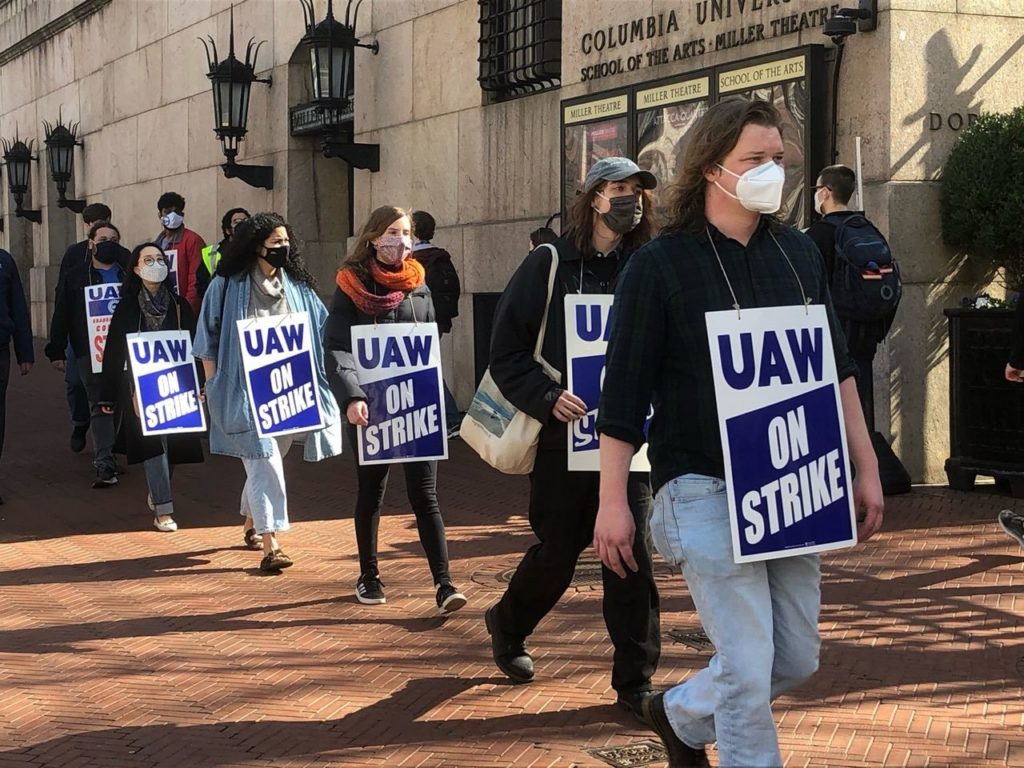Last week, the Graduate Workers of Columbia (also known as GWC-UAW Local 2110) became the first graduate student union ever to reject a tentative agreement with their university. The agreement was rejected by a margin of 1,093-970, with 63 percent of union members participating in the vote.
Much of the history of graduate labor organizing has taken the form of unions fighting just for recognition. Only in recent years have many graduate unions even had the opportunity to vote on a prospective contract — the NLRB did not rule until 2016 that graduate workers at private universities have the right to unionize. The GWC obtained NLRB certification in 2017. After the university refused to come to the bargaining table, the union first went on strike in April of 2018 and then again this past March after the no-strike pledge forced upon them by the UAW bureaucrats expired.
On April 19, the GWC bargaining committee voted 7-3 to endorse a tentative agreement, which only met ten of the union’s initial 48 demands. The agreement was met with broad criticism from the rank-and-file.
In addition to inadequate compensation and healthcare provisions, workers were particularly concerned about the tentative agreement’s failure to guarantee neutral, third-party arbitration for cases of discrmination and harassment. The existing procedure, overseen by Columbia’s office of Equal Opportunities and Affirmative Action (EOAA), consistently rules in favor of the accused as much as 95 percent of the time, such as in cases of tenured faculty raping freshmen.
One of the biggest reasons why the membership felt compelled to vote this contract down was because it did not offer adequate protections from discrimination, sexual harassment and power-based harassment.
— Yasemin Akçagüner (@yasepin) May 2, 2021
The tentative agreement also excluded hundreds of hourly workers from the bargaining unit entirely, even though the NLRB recognizes these research and teaching assistants as part of the union. Yasemin Akçagüner, a union member who is part of Columbia Academic Workers for a Democratic Union, explained on Twitter that labor lawyers agreed that once the union agreed to a contract that excluded these workers, it was extremely unlikely they would ever be included in the bargaining unit. According to Akçagüner, the bargaining committee did not notify union members of this exclusion, and the rank and file only found out due to former bargaining committee member Helen Zhao’s close reading of the agreement after the ratification vote had already begun.
Once again workers were made to feel like their labor was worthless, their voices were silenced, and their efforts in vain. We were constantly told we were a vocal minority, while the BC claimed to represent the mandate of a silent majority they assumed was conservative.
— Yasemin Akçagüner (@yasepin) May 2, 2021
Rejecting this tentative agreement is a strong declaration of solidarity with the workers who would have been excluded from the union. Those who voted “No” refused to accept any concessions that would come at the expense of their colleagues.
You might be interested in: What Are Unions and Why Do They Matter?
This historic vote took place in the middle of another graduate worker strike downtown at the other end of Manhattan. Graduate students at NYU, represented by GSOC-UAW Local 2011, are entering the second week of their strike for higher wages and getting cops off of their campus. The Graduate Labor Organization (GLO) at Brown University also reached a tentative agreement last week with proposed raises far outstripping those being offered by Columbia and NYU, and the LUC Worker Coalition at Loyola University won a raise of $10,000 for all PhD students the week before.
The strong fighting stance taken by the rank-and-file workers at Columbia alongside the gains at Brown and Loyola will hopefully put pressure on NYU and other university administrations currently bargaining with graduate workers. While GWC-UAW heads back to the bargaining table, many Columbia graduate workers are organizing to support their fellows at NYU.
Take our homework any day @GSOCUAW we know you would do the same for us ❣️❣️❣️ https://t.co/K3r7xytzfF
— Back to the bargaining table bébé ? (@C_AWDU) May 3, 2021
This kind of mutual solidarity is not only heartwarming, but also strengthens the position of every union involved. When workers across job sites are in communication with one another, it’s more difficult for management to pull dirty tricks and push through weak contracts. Graduate workers across the United States and the world can take heart at the fight currently happening in New York City and learn from both their successes and the difficulties faced by these workers in their struggle for a strong contract. Graduate students and other precariously employed academics such as adjuncts make up 70 percent of all instructional positions at colleges and universities. Universities exploit them as cheap alternatives to hiring full time faculty to teach their courses, and it is these workers who bear the brunt of budget cuts and other austerity measures. By standing together, graduate workers across the United States are able to demand more.











